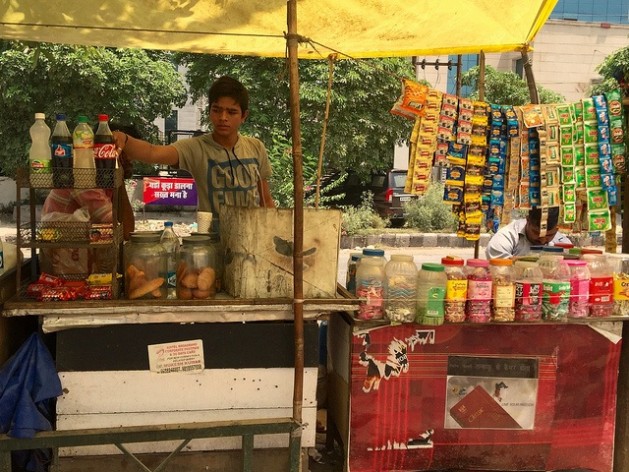The Plight Of India's Street Vendors
MANISHA SHASTRI

BENGALURU: It is estimated that the total number of street vendors in India is around 10 million and they constitute an important segment of the population. Vending for years has been a source of employments and income for many urban poor in the country as it requires low skills and not much financial investment.
Broadly defined, a street vendor is a person who offers goods or services for sale to the public but through a temporary static structure or mobile stall (or head-load), not a permanent structure. They could be stationary or occupying space on the pavements or other public/private areas, or could be mobile, and move from place to place carrying their wares on push carts or in cycles or baskets on their heads, or could sell their wares in moving buses/ trains and at traffic signals.
Street vendors have for long been perceived as a public nuisance, accused of encroaching pavements, causing traffic jams, and having links with anti – social elements. The lack of recognition of their role causes them to face a plethora of problems beginning with insecurity of earning and work space, constant threat of eviction and fines imposed by the police and local authorities.
Apart from poor social protection, their conditions of work on the streets expose them to a variety of safety and health issues. In a study done by ILO in Mumbai, it was found that around 85 per cent of the street vendors complained of stress related diseases – migraine, hyper acidity, hyper tension and high blood pressure.
The plight of street vendors across India often goes unrecognised and unacknowledged, despite their long standing struggle for recognition and regulation. They constantly work under demanding conditions for long hours; often facing harassment by the local authorities and police. The average earnings of street vendors range between 40 and 80 rupees per day; a large part of which goes in paying bribes and ‘protection money’.
State legislations relating to street vendors are varied, and little has translated into actual action on the ground.
Challenging and overcoming many of the above mentioned difficulties, the street vendors in the city of Bangalore have finally won their long fought battle for official recognition. The Bruhat Bengaluru Mahanagara Palike (BBMP) will be conducting the first-ever survey of street vendors, to eventually provide them with official identity cards. The survey covering all zones of Bangalore began on 18th September 2017, and is estimated to enrol two lakh street vendors by September 25.
The BBMP is conducting the survey with the primary objective of identifying beneficiaries under the Union government’s Deendayal Antyodaya Yojana – National Urban Livelihoods Mission (DAY-NULM). One of the provisions within the scheme is to provide support for street vendors, under which they shall be given provisions such as credit for their business; basic facilities in the markets like godowns, water, toilets etc.; push-carts etc. However, before any of these benefits and facilities are provided to street vendors, they need to be identified.
The BBMP has set aside a budget of rupees two crores for beneficiaries of the DAY-NULM in the 2017-18.
The survey will be conducted by BBMP officials, who may take support of other officials such as the local police. Information gathered from the street vendors will include proof of identity (Ration Card/ Voter ID), passport size photograph and a family photo, alongside a form that will be filled – no costs are involved for the vendors in this. Family photos of the street vendors are being sought to avoid harassment in case of a vendor being unable o ply his trade, and a relative has to take over.
All information gathered by BBMP in the course of this survey will be digitised, following which a SMS would be sent to each vendor, once their data has been uploaded. A provisional list of vendors will then be displayed at the various ward offices, with a call for objections. Once the list is issued, there are provisions for those whose names have been left out to raise and file objections.
While the survey is a good first step, the battle is only half won; the State government is yet to notify rules for the Street Vendors (Protection of Livelihood and Regulation of Street Vending) Act, 2014.



